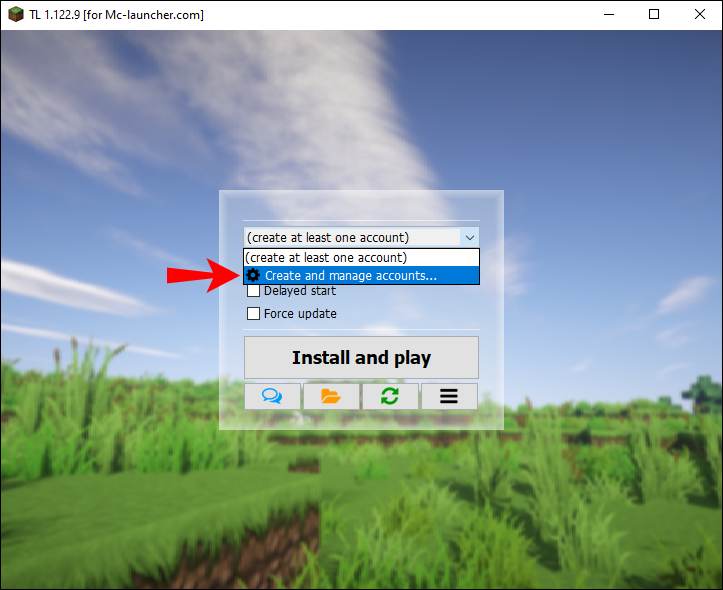Minecraft is far from being the most expensive game on the market. However, 20 bucks is 20 bucks, especially for new players who may want to try out the game before purchasing it for the full price. We created this guide to help you play the game for free.
In this article, we’ll share several ways of downloading Minecraft for free on mobile devices, Windows, and Mac computers. Additionally, we’ll explain how to set up a Minecraft account and play the game with friends on a local or external server.
Downloading Minecraft For Free
The instructions for playing the free Minecraft version differ significantly depending on the operating system of your device – find a suitable guide below.
iPhone
Sadly, downloading the official Minecraft version on an iPhone for free is impossible. There are plenty of websites that offer a free download of Minecraft Pocket Edition for iPhone, but we can’t recommend any particular option. There’s always a chance of getting a virus when installing pirated games, and you should be aware of the consequences. However, a free version of the game is available for Windows and Mac computers. If you own a PC or laptop running on one of these operating systems, find the instructions for installing free Minecraft below.
Android
A free trial of Minecraft Pocket Edition is available for Android users. Follow the steps below to claim it:
- Visit the official Minecraft site and click the Android icon. You will then be redirected to Google Play.
- Click Install and wait for the game to upload.
- Open the game on your phone and register or sign in to an existing account to start playing.
The free trial only lasts for 90 minutes, but there’s a way to extend it endlessly. Here’s how to do that:
- Stop playing before the 90-minute trial ends. We recommend playing no longer than 80 minutes to ensure you have enough time for the next steps.
- Quit and save your current Minecraft world.
- Create a new world or copy your previous world. You can play in it for another <90 minutes. Then you’ll have to repeat the process again. The time doesn’t count when you exit the game.
Note: Minecraft Pocket Edition free trial is available in the US but may not work for other countries.
Windows 10
The first way to play Minecraft for free is to use the TLauncher. The tricky part here is that using TLauncher is against Minecraft’s User Agreement. The download website may also contain viruses, so we recommend using a VPN and antivirus to protect your PC during the installation. Follow the steps below to install Minecraft using TLauncher:
- Go to the Minecraft download page and click Download. It’s a small text located below the Get It Now button.

- Once redirected to a new page, click Request Download Links.
- On a new page, select the download option for Windows (.exe file).

- Once the file is uploaded, click on the launcher icon twice to run it.
- In the launcher installation window, expand the dropdown menu and select Create and manage accounts.

- Click the green plus icon to register an account, then select Free (w/o password). Follow on-screen instructions. Optionally, click Mojang.com account if you already own an account.

- Select your account and click the orange house icon to log in.

- Once you’re logged in to your account and redirected back to the installation window, select the Minecraft version you wish to install from the dropdown menu.

- Click Install and play and wait for the installation to finish. Then, launch the game and start playing.

If you don’t want to risk the safety of your computer, you can play the official Minecraft demo for free for 100 minutes. This isn’t a lot, but it should be sufficient for you to decide whether the full version is worth paying for. Here’s how to install the Minecraft demo:
- Visit the official Minecraft website and click Download For Windows to download the demo installation file.

- Once the file is downloaded, click on it twice to run the installation process.
- Follow on-screen instructions.
- Once the Minecraft Launcher is installed, click on its icon twice to open it. You can find the icon on your desktop or in the Start menu.

- Click Sign Up, then register a new Minecraft account or log in to an existing one.

- Once logged in, click Play Demo. The 100-minute demo period can be extended for up to five days. When it’s expired, you’ll have to purchase the full version.

Finally, you can play the official Minecraft Classic 2009 version for free for an unlimited period. Follow the steps below to install it:
- Download the installation file.
- Type in your username.

- Click Start, and you’re ready to go.

Mac
Same as Windows users, Mac Minecraft players have three options to play the game for free. The first one is to install the game using TLauncher:
- Go to the Minecraft download page and click Download. It’s a small text located below the Get It Now button.

- Once redirected to a new page, click Request Download Links.
- On a new page, select the download option for Mac (.jar file). Make sure you have the latest version of Java to run the file.
- Once the file is uploaded, click on the launcher icon twice to run it.

- In the launcher installation window, expand the dropdown menu and select Create and manage accounts.

- Click the green plus icon to register an account, then select Free (w/o password). Follow on-screen instructions. Optionally, click Mojang.com account if you already own an account.

- Select your account and click the orange house icon to log in.

- Once you’re logged in to your account and redirected back to the installation window, select the Minecraft version you wish to install from the dropdown menu.

- Click Install and play and wait for the installation to finish. Then, launch the game and start playing.

The second option is to play a 100-minute official Minecraft demo:
- Visit the official Minecraft website and click Download For MacOS to download the demo installation file.

- Once the file is uploaded, click on it twice to run the installation process.
- Follow on-screen instructions.

- Once the Minecraft Launcher is installed, click on its icon twice to open it. You can find the icon in the Applications folder.

- Click Sign Up, then register a new Minecraft account or log in to an existing one.

- Once logged in, click Play Demo. The 100-minute demo period can be extended for up to five days. When it’s finished, you’ll have to purchase the full version.

The last option is to play the first version of Minecraft. The installation process is extremely simple:
- Download the installation file.
- Type in your username.

- Click Start, and you’re ready to go.

How to Set Up a Minecraft Account?
A Minecraft account is required to play any version of the game. Thankfully, setting up an account is free, and you can use it with the free game version without any issue. The steps are all the same, regardless o the device you are using.
- Visit the official Minecraft site and click the Log In button located in the upper-right corner of your screen.

- Select Sign in With Microsoft if you own a Microsoft account. The sign-in will happen automatically; no further steps are required from your end.

- If you don’t have a Microsoft account or don’t want to use it, select Sign up for free.

- Type in your email address, then click Next.

- Enter your password and click Next.

- Select your region and date of birth, then click Next.

- Open your email and enter the verification code you’ve received from Minecraft to the registration window.

- Solve the Captcha.

- Create a Minecraft username and select an avatar, then click Let’s Go.
Frequently Asked Questions
In this section, we’ll answer more questions about playing Minecraft.
How to Play Minecraft With Friends on Mobile?
If all of your friends use the same Wi-Fi network, you can play on a local server. Follow the steps below to start playing together:
1. Open the game Settings.
2. Shift the toggle button next to Local Server Multiplayer to the On position.
3. Load the world you want to play in on your device before other players load it. You’re now the host of the game.
4. Your friends should tap Play and select the world located at the top of their list and highlighted in blue.
If your friends are using a different network, you will have to create a new external server or use an existing one. Follow the instructions below:
1. Visit the Minecraft Pocket Edition server list to find your server information.
2. In the game, tap Play, then navigate to the Servers tab.
3. Tap Add server to connect to an external server.
4. Fill in the required information – server name, IP address, and port number.
5. Tap Play to start playing.
Enjoy Minecraft for Free
Hopefully, with the help of our guide, you can now play Minecraft for free. Be aware of viruses when downloading unofficial game versions. We recommend using antivirus and VPN software to scan all files before installation. And if you truly enjoy the game, consider paying for the official version to pay respect to the developers.
Do you know any safe and trusted sites for downloading Minecraft for free on iPhone? Share your experiences in the comments section below.
Disclaimer: Some pages on this site may include an affiliate link. This does not effect our editorial in any way.








































